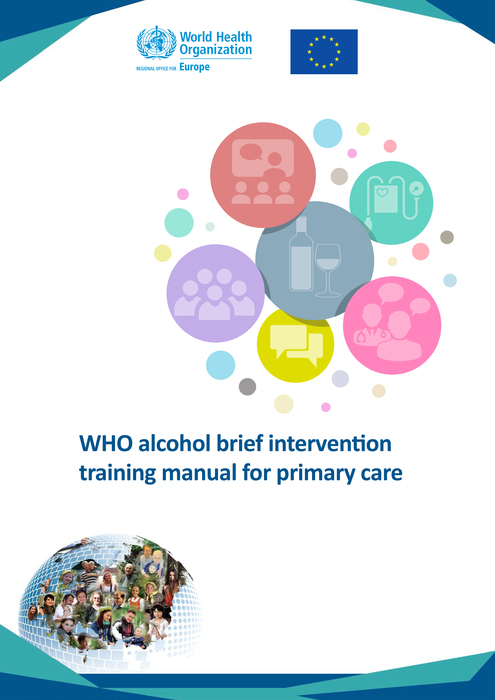WHO alcohol brief intervention training manual for primary care (2017)

Download
The need to promote evidence-based interventions such as screening and brief interventions (SBIs) has never been greater; the European Region has the highest level of alcohol consumption among all WHO regions, and alcohol-related mortality has increased over the last 2 decades. Now is the time to ensure that all Member States have tools to address alcohol-related problems through their primary health care systems.
The European action plan to reduce the harmful use of alcohol 2012–2020 highlights the vital role of the primary health care system in reducing alcohol-related harm through the delivery of SBIs for alcohol. SBIs focus on identifying individuals who are drinking at levels that may have a negative impact on their health and delivering interventions to motivate and support them to reduce or stop drinking. Such interventions vary in length, content, deliverer and delivery style. These are not a substitute for, but a complement to, treatment services for alcohol dependence. Governments can support the success of SBI programmes by ensuring that primary care providers receive the necessary training, resources and structural support.
The manual has been developed to be used by Member States to expand and improve the training of health professionals on alcohol and SBI. Together with other supportive measures at the level of the health system, such training has the potential to reduce the gap between the number of people who would benefit from reducing their consumption, and the number who actually receive support or advice to do so.
Overview of the training manual
The SBI model outlined in the training materials is based on international expert consensus, which was established during a series of discussions at the International Network for Brief Interventions on Alcohol and Other Drugs (INEBRIA). This training manual describes how to prepare for and set up training in SBI for health professionals in primary health care settings. Furthermore, the manual outlines in detail interactive activities and role plays that form part of the training, in order to develop providers’ skills in addressing alcohol consumption with patients. The manual also includes a section on the evidence regarding the impacts of alcohol on individual health as well as the health care system and society at large. At a systemic level, the materials also include considerations for developing training for trainers.
Adapting SBI training within countries
The training materials provide an overall approach to SBI implementation and skill development, which is applicable in different contexts.
However, for the training to be relevant within specific countries, adaptations of the materials are needed. These include country-specific data on alcohol consumption and related harm, as well as the national context for the organization of the primary health care system and treatment pathways.
This publication was produced with the financial assistance of the European Union. The views expressed herein can in no way be taken to reflect the official opinion of the European Union.



